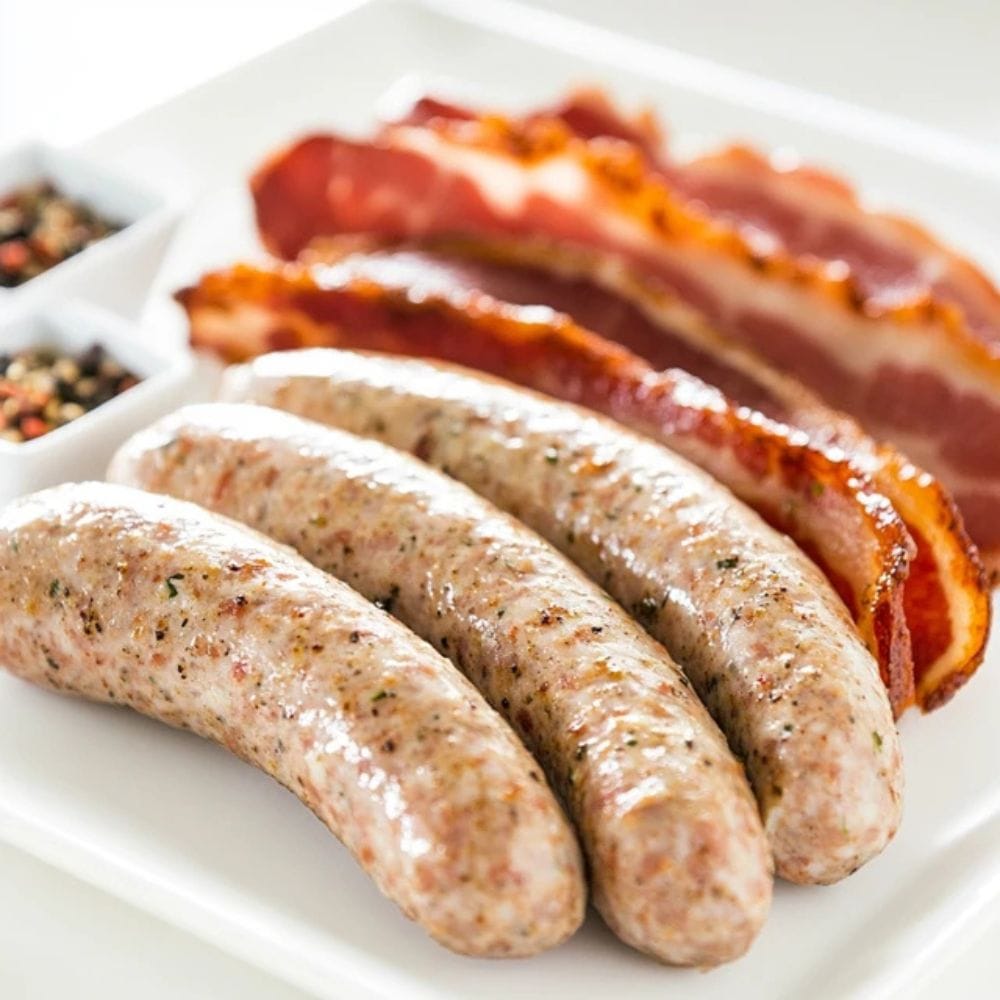Well, I’ve asked myself that a dozen times because I keep hearing different opinions. Which is healthier, turkey sausage or bacon? That’s the focus for today, so let’s get cooking with some straight talk. I’ve grown up in the South, and I do love a hearty breakfast. Yet I’ve learned that what tastes good might not always be the smartest choice for our hearts. Also, I want to know how these classic breakfast meats stack up. Some folks claim turkey sausage wins hands down, and others say bacon is fine if we watch portions. Let’s sort through the details and find real answers.
I’ve seen old traditions, new cooking trends, and plenty of conversation surrounding both. Which is healthier, turkey sausage or bacon? remains a recurring question because many health-conscious eaters want to swap traditional pork bacon for a leaner option. In truth, these meats share more similarities than you might expect, though they differ in vital areas such as saturated fat content, sodium levels, and overall health impact. Which is healthier, turkey sausage or bacon? keeps popping up because we all want tasty breakfasts that won’t break our health goals. Hang tight as we dig deeper and figure out your best fit for flavor and wellness.
Nutritional Profiles of Turkey Sausage and Bacon

Which Is Healthier in Terms of Calories: Turkey Sausage or Bacon?
For those aiming to cut extra calories at breakfast, the comparison between turkey sausage and bacon depends on portion size and preparation. While turkey sausage generally has fewer calories, it’s not always guaranteed—some brands contain fillers that increase the calorie count. Bacon, on the other hand, varies depending on thickness and fat content, with cooking methods influencing the final calorie total.
- Turkey sausage – Often lower in calories but may contain added fillers.
- Bacon – Higher-calorie per slice but can be leaner depending on cut and preparation.
- Portion control matters – Two slices of bacon may have more calories than a single turkey sausage patty, but eating multiple patties shifts the balance.
- Cooking method affects calories – Draining bacon on a paper towel can remove some fat, while turkey sausage might hold onto more moisture.
Checking nutrition labels is key since serving sizes can be misleading. Some bacon brands list one slice per serving, while turkey sausage may count a patty and a half. Understanding these portions helps prevent overeating unintentionally.
Fat and Saturated Fat Levels
Fat content, especially saturated fat, plays a major role in deciding between turkey sausage and bacon. While turkey sausage often has less saturated fat than pork bacon, this isn’t always true—especially if the sausage is heavily processed or made with dark meat. Leaner bacon cuts can sometimes rival turkey sausage in fat content.
- Turkey sausage – Often lower in saturated fat but can still contain high amounts if dark meat is used.
- Bacon – Naturally higher in fat, though leaner cuts can reduce the difference.
- Both are processed meats – Watching for hidden fats in pre-seasoned or flavored varieties is important.
- Draining fat helps – Some believe patting bacon dry can lower fat intake, while turkey sausage can also be blotted after cooking.
For those focused on heart health, opting for “lean” or “reduced fat” versions of either can help keep saturated fat levels lower while maintaining flavor.
Protein Content Analysis
Protein is essential for muscle growth and satiety, making it a critical factor in comparing turkey sausage and bacon. Turkey sausage tends to have a higher protein content per serving, which explains why it’s often favored by those looking for a filling breakfast.
- Turkey sausage – Typically contains 8-9 grams of protein per link, offering a solid protein boost.
- Bacon – Ranges from 3-6 grams of protein per slice, depending on the cut.
- Better for satiety – Higher protein meals help regulate appetite and energy levels throughout the morning.
If protein intake is a priority, turkey sausage usually wins. However, portion sizes matter, and two slices of bacon may provide as much protein as a smaller sausage patty.
Sodium Considerations
Sodium content is another key factor. Processed meats often contain high levels of salt, and both bacon and turkey sausage are no exception. However, bacon tends to be saltier, though some turkey sausage varieties also pack in considerable sodium.
- Bacon – Higher sodium per slice, which can impact blood pressure.
- Turkey sausage – Still salty but often lower than bacon; low-sodium versions are available.
- Cooking method influences sodium intake – Pan-frying bacon without draining excess grease can lead to additional salt consumption.
Those monitoring sodium intake should look for low-sodium turkey sausage options or limit bacon consumption to avoid excessive salt levels.
Cholesterol Content Comparison
Cholesterol content in turkey sausage and bacon depends on serving size and preparation. While turkey sausage generally has less dietary cholesterol than bacon, the impact on blood levels varies based on overall diet and genetics.
- Turkey sausage – Usually lower in cholesterol than pork bacon but still contributes to intake.
- Bacon – Higher in cholesterol per slice, though portion control helps minimize impact.
- Saturated fat matters as much as cholesterol – The presence of unhealthy fats affects heart health just as much as cholesterol levels.
For those concerned about cholesterol, moderation is key. A small serving of bacon occasionally may not be harmful, but keeping an eye on daily intake is important for long-term health.
Processing Methods and Health Implications
Understanding Processed Meats and Health Risks
Processed meats include products that have been smoked, salted, cured, or otherwise altered to enhance flavor and extend shelf life. Both bacon and turkey sausage fall into this category, prompting health experts to recommend moderation. These meats frequently contain nitrates or nitrites as preservatives, compounds that have been associated with potential cancer risks. This raises the question: Which is healthier, turkey sausage or bacon? Since both meats undergo processing, the difference may not be as clear-cut as it seems.
That said, not everyone is ready to cut bacon or sausage from their diet entirely. Some people opt for versions labeled “uncured” or “nitrate-free”, hoping for a safer alternative. However, the best approach is limiting consumption rather than treating them as daily staples. If you want to understand more about how processed meats are made and their impact on health, check out this guide on What Is Processed Meat?, which explains the processing methods and health considerations.
Suggestion: If you love bacon or turkey sausage, enjoy them in smaller portions and pair them with fresh produce or whole grains to create a more balanced meal.
Additives and Preservatives in Turkey Sausage and Bacon
Some brands of turkey sausage include flavor enhancers and preservatives such as MSG or sodium phosphate, while bacon often contains sugar, sodium nitrate, or curing salts. While these additives are not necessarily harmful in small amounts, they can be problematic for individuals with sensitivities or dietary restrictions.
- Turkey sausage – May contain added MSG or stabilizers to improve texture.
- Bacon – Typically cured with nitrates, nitrites, and sometimes added sugars.
- Natural or organic labeling – Can indicate fewer synthetic ingredients but does not always mean a product is significantly healthier.
Reading ingredient lists can help you avoid excessive additives. Some bacon products feature sugary glazes, while turkey sausage links might contain unexpected sweeteners. If you prefer cleaner options, look for brands that minimize added preservatives.
Tip: Many grocery stores now carry “clean-label” turkey sausage and bacon, offering fewer artificial ingredients for those aiming for a more natural diet.
Impact on Heart Health
Which Is Healthier in Terms of Saturated Fat and Heart Disease Risk: Turkey Sausage or Bacon?
Heart health is a major concern when comparing turkey sausage and bacon. Diets high in saturated fat can contribute to an increased risk of heart disease, making fat content an important factor in choosing between the two.
- Bacon – Usually higher in saturated fat, but leaner cuts reduce this.
- Turkey sausage – Can be lower in saturated fat, but dark meat varieties may still contain significant amounts.
- White turkey meat-based sausage – Offers a lower-fat alternative to both standard turkey sausage and bacon.
Ultimately, portion control is key. A few slices of bacon here and there won’t dramatically impact heart health if the rest of your diet is balanced. However, checking nutritional labels helps ensure you’re not unknowingly consuming excess fat.
Balance Tip: Whether you choose bacon or turkey sausage, pairing them with whole grains, fruits, or vegetables can help offset the impact of saturated fat.
Sodium’s Role in Hypertension
For those concerned about high blood pressure, sodium content is a crucial factor when determining which is healthier, turkey sausage or bacon? Both meats are high in sodium, which can contribute to hypertension if consumed in excess.
- Bacon – Typically has more sodium per slice.
- Turkey sausage – Still high in sodium but often lower than bacon.
- Low-sodium options – Available in both categories, but not always easy to find.
Monitoring sodium intake beyond just breakfast meats is important since breads, cheeses, and condiments also contribute to daily sodium totals. If you are watching your salt intake, you may want to explore low-sodium turkey sausage or reduced-sodium bacon options.
For more insight into how sodium affects health, read this Is Bacon Bad for You, or Good? article, which discusses sodium concerns and bacon’s role in a balanced diet.
Cancer Risk and Processed Meats
Which Is Healthier in Terms of Nitrates, Nitrites, and Cancer Links: Turkey Sausage or Bacon?
Research suggests that consuming processed meats regularly may increase the risk of certain cancers. This is largely due to the use of nitrates and nitrites—preservatives that enhance color and flavor while extending shelf life. Both bacon and turkey sausage contain these additives, making it difficult to declare one significantly safer than the other.
- Bacon – Cured with nitrates and nitrites, which may form harmful compounds when cooked at high temperatures.
- Turkey sausage – Also processed, but sometimes available in nitrate-free varieties.
- Cooking methods matter – Frying at very high temperatures can increase harmful compound formation.
Interestingly, nitrates and nitrites are also found naturally in vegetables, but they behave differently when consumed from plant sources. The main concern with processed meats is that high-heat cooking can trigger chemical reactions that may increase cancer risk.
Recommendations from Health Organizations
Health organizations generally recommend limiting processed meat intake, rather than cutting it out entirely. They emphasize moderation, encouraging people to balance their diet with whole foods like fruits, vegetables, and lean proteins.
- Processed meats should be occasional, not daily staples.
- Those with a family history of heart disease or cancer should be more cautious.
- Replacing processed meats with fresh, lean proteins like chicken, fish, or plant-based options is a good alternative.
If you have specific health concerns, consulting a registered dietitian or physician can provide personalized advice. Some individuals do well with a mostly plant-based approach, while others allow an occasional strip of bacon or turkey sausage link as part of a well-rounded diet.
Weight Management Considerations

Weight Management Considerations
Which Is Healthier in Terms of Calorie Density and Satiety: Turkey Sausage or Bacon?
For those managing weight, the choice between turkey sausage and bacon often comes down to calorie density and satiety. Turkey sausage generally provides more protein per serving, which can help curb hunger for longer periods. Bacon, however, offers a stronger flavor that some people find satisfying in smaller portions.
- Turkey sausage – Moderate calorie count with a good protein boost for satiety.
- Bacon – Often higher in calories per serving but may be more satisfying in small amounts.
- Satiety varies by person – Some feel full after a turkey sausage link, while others prefer the crisp texture of bacon to avoid over-snacking.
- Personalized approach – The best choice depends on how your body responds to different protein sources.
Some people find that two strips of bacon with eggs keep them full, while others prefer a turkey sausage patty with whole-grain toast for sustained energy. The key is balancing satisfaction with calorie intake so you don’t feel deprived or overeat later.
Tip: Pairing either turkey sausage or bacon with fiber-rich foods like avocado, whole-grain toast, or oatmeal can enhance fullness and regulate hunger more effectively.
Lean Protein Alternatives
For those looking to reduce calories and fat while maintaining flavor, alternative breakfast proteins can offer a healthier compromise. While turkey sausage and bacon remain popular, other lean options exist that provide similar satisfaction with fewer drawbacks.
| Alternative | Protein (Per Serving) | Typical Fat (g) | Comments |
|---|---|---|---|
| Turkey Bacon | 2-3 g | ~2-3 g | Often has less fat but varies by brand. |
| Chicken Sausage | 7-9 g | ~5 g | Flavor varies depending on ingredients. |
| Canadian Bacon | ~5-6 g | ~2 g | A leaner cut from pork loin. |
- Turkey bacon – A lower-fat alternative to pork bacon, though some brands contain added preservatives and flavor enhancers.
- Chicken sausage – Can be leaner than turkey sausage while offering a different flavor profile.
- Canadian bacon – A pork option that is significantly leaner than regular bacon.
Taste satisfaction matters, so it’s important to find a balance between flavor and health goals. If turkey sausage or bacon doesn’t excite you, you might overeat other items to feel satisfied. Testing different alternatives can help you determine the best fit for your dietary preferences.
For those curious about more breakfast choices, check out 8 Popular Breakfast Foods Dietitians Want You to Stop Eating to learn which items may pose dietary concerns and how to make smarter morning meal choices.
If you’re looking for a more adventurous twist on turkey sausage, you might explore Turkey Italian Sausage for a burst of hearty flavor. Some people wonder, though—Is Turkey Italian Sausage Healthy? That depends on the brand and cooking method, but it often carries fewer calories and saturated fats compared to pork-based options. It can satisfy your craving for robust seasonings without piling on unnecessary extras. By choosing quality brands and paying attention to sodium or additives, you can savor a new favorite that fits well with your health goals.
Dietary Preferences and Restrictions
Suitability for Low-Sodium Diets
For individuals following a low-sodium diet, choosing between turkey sausage and bacon can be challenging, as both are often high in salt. While turkey sausage may appear healthier, it can still contain significant sodium levels due to seasoning and preservation methods. On the other hand, “lower sodium” bacon options exist but still tend to have more sodium compared to fresh, unprocessed meats.
- Turkey sausage – Can still be high in sodium, despite being marketed as a healthier choice.
- Bacon – Lower-sodium varieties exist, but they remain relatively salty compared to fresh meats.
- Homemade alternatives – Fresh turkey or beef, seasoned at home, allows for better sodium control.
- Checking labels is crucial – Some brands are significantly higher in sodium than others.
For those needing to drastically reduce sodium, it might be best to consume these meats occasionally or replace them with fresh alternatives. Some people rinse bacon slices before cooking to remove excess salt, though this can diminish flavor. A better alternative is making homemade turkey sausage patties, using fresh ground turkey, sage, thyme, and black pepper to achieve a similar taste without excessive sodium.
Tip: Balance your breakfast with fruits, vegetables, or whole grains to help offset sodium intake and create a well-rounded meal.
Considerations for Low-Fat Diets
For those following a low-fat diet, turkey sausage might seem like the automatic winner, but the reality depends on how the product is made. Some turkey sausage brands include dark meat and skin, increasing fat content, while certain lean cuts of bacon might not be as fatty as expected.
- Turkey sausage – Often lower in fat, but some brands contain added fillers or dark meat that increase fat levels.
- Bacon – Higher in fat but leaner cuts, such as center-cut bacon, can be a better option.
- Label comparison is key – Brands vary widely in fat content, even within the same product line.
- “Extra lean” versions – These exist but may taste drier, so adding vegetables or healthy oils can improve texture.
Many low-fat turkey sausage brands compensate for lower fat by adding extra seasonings or fillers, which may affect overall nutrition. If choosing an extra lean option, consider pairing it with moist ingredients like sautéed onions, mushrooms, or tomatoes to enhance flavor without excessive fat.
Tip: If aiming for low fat but high flavor, experiment with lean homemade sausage using ground turkey breast, garlic, paprika, and fennel seeds for a healthier alternative that still satisfies the breakfast craving.
Cooking Methods and Their Effects

Which Is Healthier, Turkey Sausage or Bacon, When Cooked Differently?
Cooking methods greatly impact the nutritional profile of both turkey sausage and bacon. The question “Which is healthier, turkey sausage or bacon?” often depends on whether they are fried, baked, or air-fried. Each cooking method affects fat content, texture, and calorie retention.
- Oven baking – Helps drain excess grease, reducing overall fat content.
- Air frying – Uses minimal oil while maintaining crispness, though turkey sausage can dry out.
- Pan-frying – Retains more fat unless grease is drained or blotted after cooking.
| Method | Impact on Fat Content | Cooking Tip |
|---|---|---|
| Oven Baking | Helps drain grease | Use a rack for better air circulation. |
| Air Fryer | Reduces oil usage | Watch cooking time to avoid dryness. |
| Pan-Frying | Can retain more fat | Pat off grease for lower fat content. |
For a healthier option, consider baking bacon on a rack so the fat drips away or air-frying turkey sausage for a crispy texture without added oil. Additionally, seasoning blends like smoked paprika, garlic, or black pepper can enhance taste without excess salt.
Tip: Using a light olive oil spray instead of butter in the pan can slightly lower total fat and calories.
The Role of Portion Control
Portion control is essential when comparing which is healthier, turkey sausage or bacon?. Because bacon slices are thin and turkey sausage links can seem small, it’s easy to overeat both.
- Bacon’s crispiness makes it easy to consume multiple strips.
- Turkey sausage links seem small, leading some to grab an extra serving.
- Even the healthier option loses its advantage if eaten in large amounts.
Keeping portions modest ensures better control over saturated fat, cholesterol, and calorie intake. A balanced breakfast with fresh fruit, scrambled egg whites, or whole-grain toast helps keep portions in check.
Suggestion: If you enjoy a big breakfast, fill up on scrambled eggs, sautéed veggies, or a side of fruit while keeping meat portions reasonable.
Consumer Preferences and Taste
Flavor Profiles of Turkey Sausage and Bacon
For many, bacon’s smoky, crispy texture is irreplaceable. While turkey sausage offers a herbaceous, mild flavor, it lacks the intense savoriness of bacon. This can influence whether people choose health benefits or taste preference.
- Bacon – Smoky, crispy, rich in umami flavor.
- Turkey sausage – Milder, often seasoned with sage, black pepper, and garlic.
Taste can be adjusted with spices and cooking techniques. Some turkey sausage brands may feel bland to those used to bacon, but adding crushed red pepper, onion powder, or smoked paprika can enhance flavor.
- Thick-cut bacon – Provides a meatier bite.
- Thin-cut bacon – Gets crispier, faster.
- Turkey sausage browns well – If cooked properly, it can develop a nice golden crust.
Advice: If turkey sausage seems underwhelming, try different seasonings or brands with a spicier or more flavorful blend.
Market Availability and Cost Comparison
Availability and Cost Differences
The question of “Which is healthier, turkey sausage or bacon?” also depends on accessibility and pricing. Bacon is generally more widely available, while turkey sausage is gaining popularity in grocery stores.
| Product | Average Price Range | Availability |
|---|---|---|
| Regular Bacon | $3 – $6 per pack | Widely available in most grocery stores. |
| Turkey Sausage | $3 – $7 per pack | Common but slightly less available than bacon. |
| Specialty Brands | $5 – $10 per pack | Found in select health food stores. |
- Bacon dominates most grocery aisles and offers a variety of cuts.
- Turkey sausage is often pricier due to its positioning as a “healthier” option.
- Health-focused brands charge a premium for organic, nitrate-free, or free-range products.
Since grocery store sales rotate, it’s smart to buy whichever is more affordable when possible. Many consumers experiment with new brands when prices shift, leading to new favorites over time.
Tip: Keep an eye out for weekly deals, coupons, or bulk discounts to get the best value for either option.
FAQs
Is turkey sausage lower in fat than bacon?Which has more protein: turkey sausage or bacon?Are there any health risks associated with eating turkey sausage or bacon?How often can I include turkey sausage or bacon in my diet?What are some healthier alternatives to turkey sausage and bacon?
Final Thoughts
Which is healthier, turkey sausage or bacon? is a question that hasn’t stopped intriguing breakfast lovers everywhere. Turkey sausage often looks like a lean choice, yet it can carry hidden sodium or additives. Bacon might be known for its saturated fat content, but thinner cuts or controlled portions can keep it manageable in a balanced diet. Also, you can adjust cooking methods to remove extra grease or experiment with portion sizes.
I hope these insights help you sort out which is healthier, turkey sausage or bacon? in the context of your lifestyle. Some days you might crave crisp bacon, and other days, a gently seasoned turkey sausage could fit better. If you keep an eye on the nutrition labels, cooking methods, and portion sizes, you can enjoy either one from time to time. Pair them with fresh fruits, whole grains, and vegetables, and you’ve got a breakfast worth waking up for.






